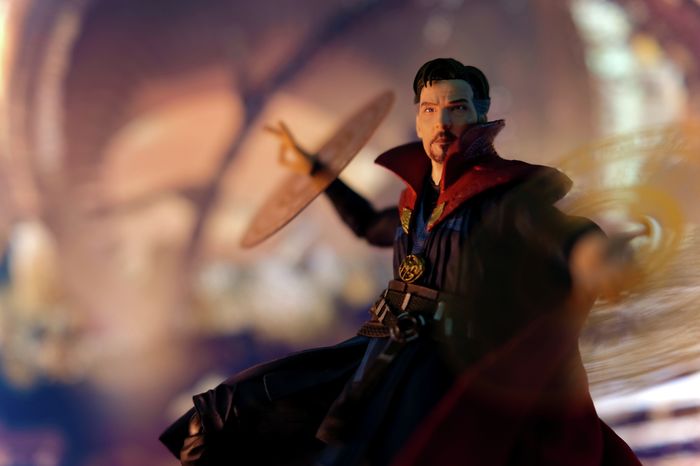Beautiful, intricate chaos: Everything Everywhere All at Once
Yingfei Chen reviews the Daniels’ world-bending masterpiece and reflects on how it represents the diasporic experience of first- and second-generation immigrants

Everything Everywhere All at Once opens with what we think we know. A struggling Chinese laundromat found on a quiet street corner, an exasperated mother with deep frown lines, a bumbling husband and a gay daughter she can’t seem to understand. The Daniels (directing duo Dan Kwan and Daniel Scheinert) throw light upon this structure, and almost immediately refract it into a swirling, prismatic vortex that sucks you in, spits you out and holds you close. In Everything Everywhere All at Once, their taste for maximalism crystallises alongside the absurdist mayhem of their music video for DJ Snake and Lil Jon’s Turn Down for What (2013) and the strange warmth of their first feature film, Swiss Army Man (2016).
Evelyn Wang, a drained woman in a mundane world, is thrust into manoeuvring infinite universes as the sole defence against the nihilistically destructive Jobu Tupaki, an incarnation of her own daughter, Joy. The film is winkingly referential in its expansive possibilities, weaving through the rain-spattered romance of In the Mood for Love (2000) to iconic juggernauts the likes of 2001: A Space Odyssey (1968), brimming with a pure love for cinema, while smoke-and-mirror illusions and puppets eclipse the plastic sheen of CGI effects. It takes it all and smashes it into a beautiful, intricate chaos.
“It is an exhaustion familiar to anyone with a background of immigration...”
At the heart of the film there is an immigrant story: we see a karaoke machine subsidised as a business expense, faded porcelain, the pull and push between old and new generations. The family seamlessly transitions between Mandarin and English in their speech, blurring the lines of the two cultures in the same way Evelyn and Joy shift between different realities after their minds are splintered through the exhaustion of “verse-jumping”. It is an exhaustion familiar to anyone with a background of immigration, that of existing in two worlds at the same time and struggling to keep up with either, all the while being shrouded in doubts and regrets. This uncertainty is intensified to a painful degree as Evelyn is forced to confront the Evelyns she might have been and wishfully lingers in each life: a glittering wuxia star Michelle Yeoh; a woman where evolution has followed the hot-dog fingered path; a hibachi grill chef with a racoon/Ratatouille twist; a Peking opera singer; a rock where life never materialised.
Within such thundering beats, there is a sustained emphasis on nihilism — how can anything ever truly matter? The crushing anxiety of not only infinity but of finding no answers within that infinity is personified in Joy/Jobu Tupaki, disillusioned to a celestially ruinous state. The black hole she creates, an all-consuming Everything Bagel, is not so much to rip the world apart, but herself. Each time she trips over her Mandarin words and awkwardly introduces her girlfriend Becky to her family, Joy wrestles with the belief that she is a failing physical embodiment of the dream her parents set out from China in search of, until she is only able to collapse inwards.
“The Daniels harness with delicacy each tone they aim to strike”
Amidst the terrifying enormity the film shocks us with, we get empathy and vulnerability. Towards the conclusion, after noise and energy, Evelyn and Joy overlook a mountainous horizon together. They sit as rocks, reduced to primordial elements. They are finally able to talk. Within the genre-bending extravaganza of Everything Everywhere All at Once, the Daniels harness with delicacy each tone they aim to strike, stripping and trans-mutating the film until love seeps into each facet of the human condition. It is a bombastic explosion that lives up to its ambitious title while avoiding the pitfalls of being overly convoluted in its sci-fi technicalities, or becoming formulaic in its approach to the multiverse. Instead, every element delivers in its campness or poignance, often simultaneously, as the Daniels treat what might be trite or cliché with imaginative flair.
Michelle Yeoh is the irresistible crux of the film, capturing Evelyn in all of her bluntness, glamour, and melancholy, injecting an unpretentious dash of fun throughout her performance. Navigating us and Evelyn through the film’s high-concept labyrinth is Ke Huy Quan, as the soft-spoken Waymond in his first appearance onscreen in 20 years. His deft and gentle depiction is one we feel we can depend on. Stephanie Hsu is magnetic as Joy, pulling off everything from cyberpunk to Elvis, as devised by costume designer Shirley Kurata, as she veers between an electric force of violence to a fragile young woman at the snap of a finger.
Everything Everywhere All at Once finds vibrancy in the human experience in the space of a single day, in a struggling Chinese laundromat found on a quiet street corner. The world becomes kaleidoscopic in its uncertainty, and we leave the cinema with fresh, perhaps slightly tearful, eyes.
 News / CUP announces funding scheme for under-represented academics19 December 2025
News / CUP announces funding scheme for under-represented academics19 December 2025 News / SU reluctantly registers controversial women’s soc18 December 2025
News / SU reluctantly registers controversial women’s soc18 December 2025 News / Cambridge welcomes UK rejoining the Erasmus scheme20 December 2025
News / Cambridge welcomes UK rejoining the Erasmus scheme20 December 2025 Features / Should I stay or should I go? Cambridge students and alumni reflect on how their memories stay with them15 December 2025
Features / Should I stay or should I go? Cambridge students and alumni reflect on how their memories stay with them15 December 2025 Film & TV / Timothée Chalamet and the era-fication of film marketing21 December 2025
Film & TV / Timothée Chalamet and the era-fication of film marketing21 December 2025










